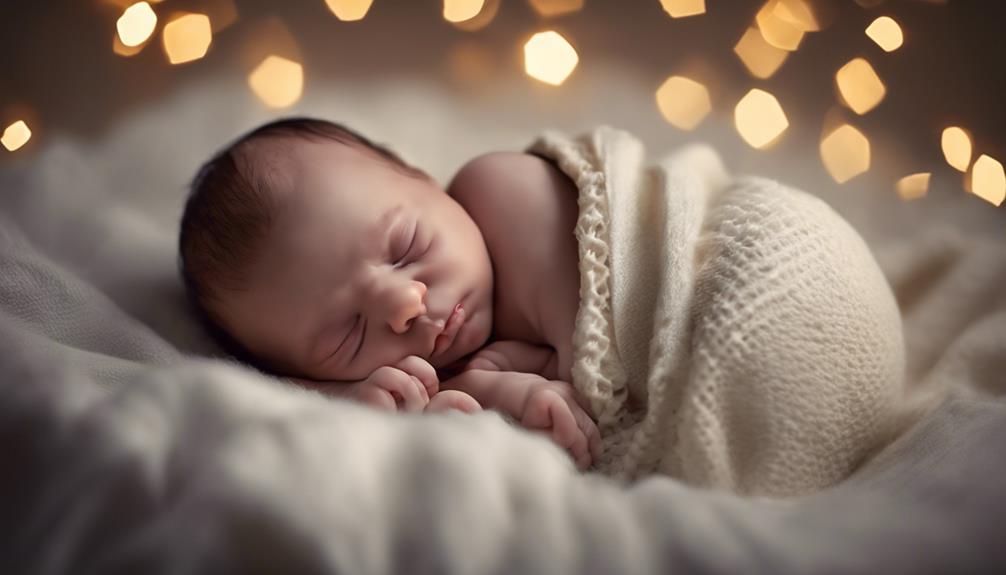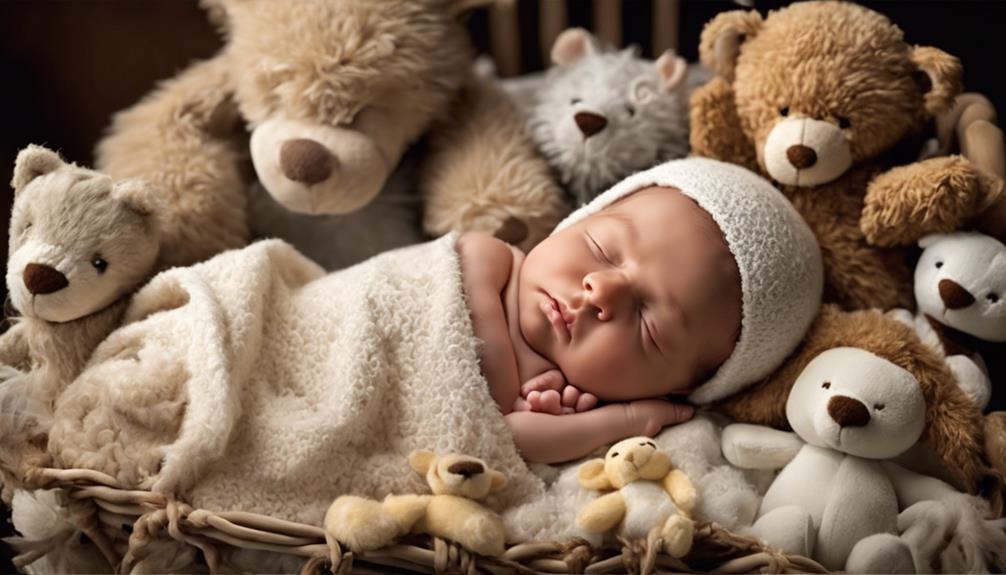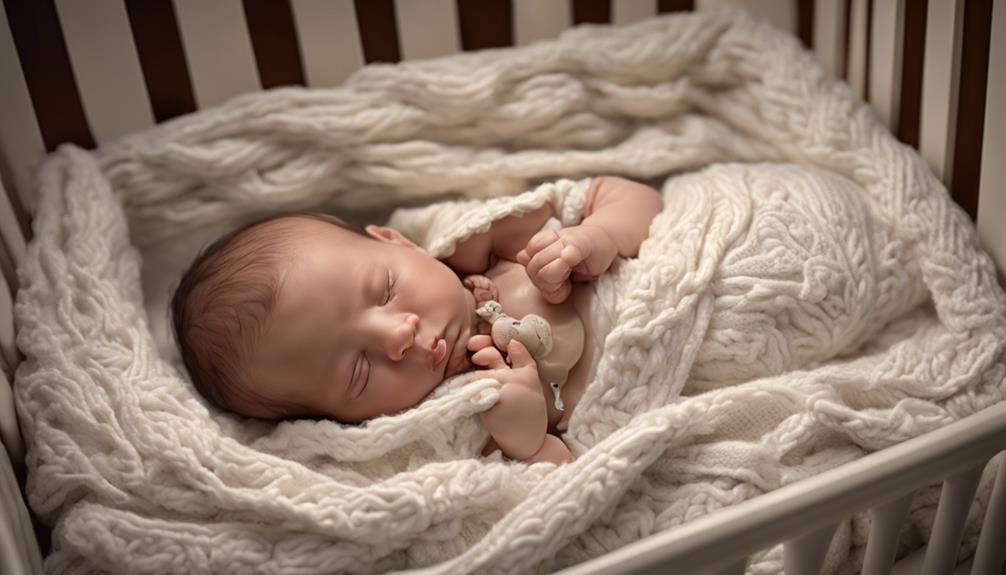Ever wondered why newborns seem to have mini dance parties in their sleep? Those adorable jerks and twitches might actually serve a purpose beyond just being cute.
Understanding the reasons behind these movements can offer insight into the fascinating world of infant development. From the intricacies of their nervous system to the wonders of REM sleep, each aspect plays a crucial role in decoding the mystery of why little ones wiggle and jiggle as they slumber.
Key Takeaways
- Newborn jerking movements signify active neural pathway formation and brain maturation.
- Jerking during REM sleep aids in brain development and motor skill coordination.
- Understanding Moro reflex helps interpret newborn behaviors and support their development.
- REM sleep is crucial for cognitive function, memory consolidation, and healthy brain development in infants.

Babysense 7 Baby Sleep Breathing Movement Monitor for Newborn and Infants, No WiFi, Non Wearable, Non Contact Monitor with 2 Under-Mattress Sensors for Full Crib Coverage, FSA Baby Monitor
HSA/FSA APPROVED – Babysense is a highly sensitive device that monitors and detects even the slightest baby's movements…
As an affiliate, we earn on qualifying purchases.
As an affiliate, we earn on qualifying purchases.
Immature Nervous System
Newborns exhibit jerking movements during sleep primarily due to their developing and immature nervous system. These muscle twitches and jerking movements are a result of the immature reflexes and spontaneous contractions that the newborn experiences as their brain development progresses. The jerking movements may seem alarming to parents, but they're a normal part of a newborn's sleep cycles.
The immature nervous system of a newborn is constantly adapting and forming new neural pathways, which can lead to these reflexive movements during sleep. As the brain continues to develop, signals may sometimes misfire, causing the body to twitch involuntarily. These jerking movements are a sign that the nervous system is actively maturing and adjusting to the outside world. Understanding that these movements are a natural part of a newborn's development can help reassure parents and caregivers that their baby is growing and evolving as expected.

Pink Stork Baby Sleep Drops, Naturally Support Sleep Without Melatonin for Infants, Toddlers, and Kids, Aid Sleep with Chamomile and Magnesium, Baby Essentials for Bedtime, 1 oz, 30 Servings
Healthy sleep leads to happy, healthy babies! Pink Stork has delivered the latest addition to our Pink Stork…
As an affiliate, we earn on qualifying purchases.
As an affiliate, we earn on qualifying purchases.
Rapid Brain Development
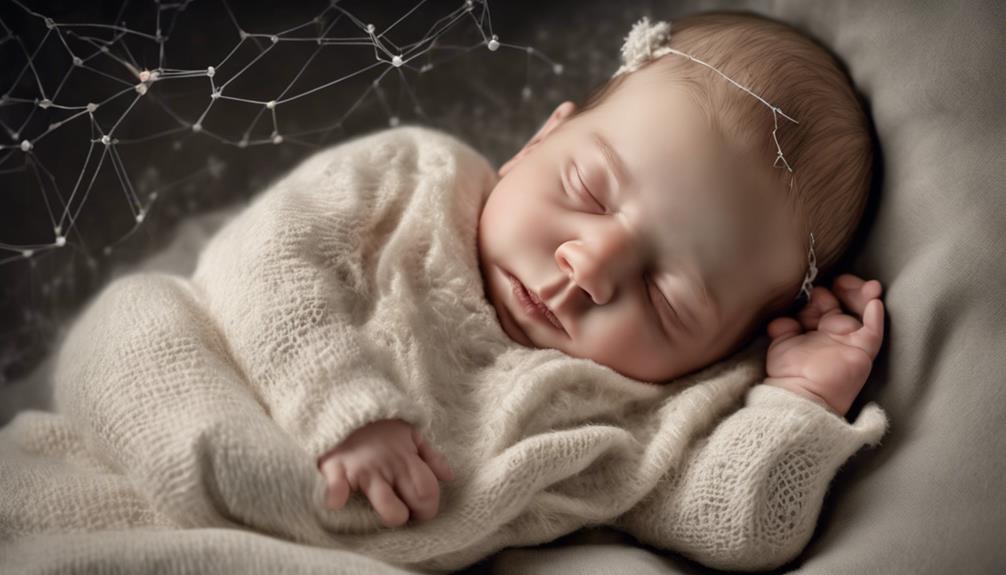
In the context of rapid brain development, the twitches observed in newborns during sleep are intricately linked to bursts of brain activity, specifically occurring during REM sleep. This period of intense brain activity plays an important role in shaping the neurological pathways responsible for various motor skills and coordination in newborns.
Here are five key points to take into account regarding newborn twitching and brain development:
- REM sleep triggers bursts of brain activity that manifest as muscle twitches in newborns.
- Brain circuits activated during twitching aid in the development of limb coordination and awareness.
- Twitching patterns during sleep may help synchronize the maturation of developing brain structures essential for motor skills.
- Understanding the relationship between newborn twitching and brain development is essential for early detection of neurodevelopmental disorders.
- The coordination between twitching episodes and brain activity offers insights into the intricate process of newborn brain maturation during sleep.
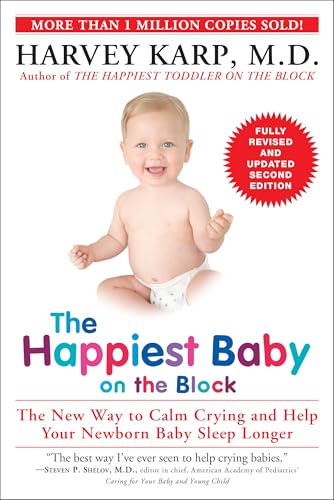
The Happiest Baby on the Block; Fully Revised and Updated Second Edition: The New Way to Calm Crying and Help Your Newborn Baby Sleep Longer
Author: Harvey Karp.
As an affiliate, we earn on qualifying purchases.
As an affiliate, we earn on qualifying purchases.
Moro Reflex

The Moro reflex, a primitive involuntary response in infants, is triggered by sudden movements or loud noises, causing the newborn to extend their arms, legs, and fingers in a startle reaction.
This startle reflex, also known as the Moro reflex, is an involuntary response commonly observed in newborns. It's considered a primitive instinct designed to help newborns react to potential dangers or disturbances in their environment.
The extension of arms and legs accompanied by fingers spreading apart is a characteristic feature of this reflex. As the baby's nervous system matures, typically around 3 to 6 months of age, the intensity of the Moro reflex diminishes.
Understanding this reflex can provide insight for parents and caregivers into their newborn's reactions and behaviors during sleep, aiding in the interpretation of their movements and responses. Being aware of the Moro reflex can help create a nurturing environment that supports the baby's development and comfort during sleep.

Black and White Baby Books for Newborn – Tummy Time Mirror & Sensory Toys Soft Montessori Toy for Infant Visual Stimulation, Brain Development & Early Learning – High Contrast Toys for 0-6 Months
Stimulate Your Baby’s Senses: This black and white baby book, designed for babies 0-6 months, features high-contrast black…
As an affiliate, we earn on qualifying purchases.
As an affiliate, we earn on qualifying purchases.
Light Sleep Cycles
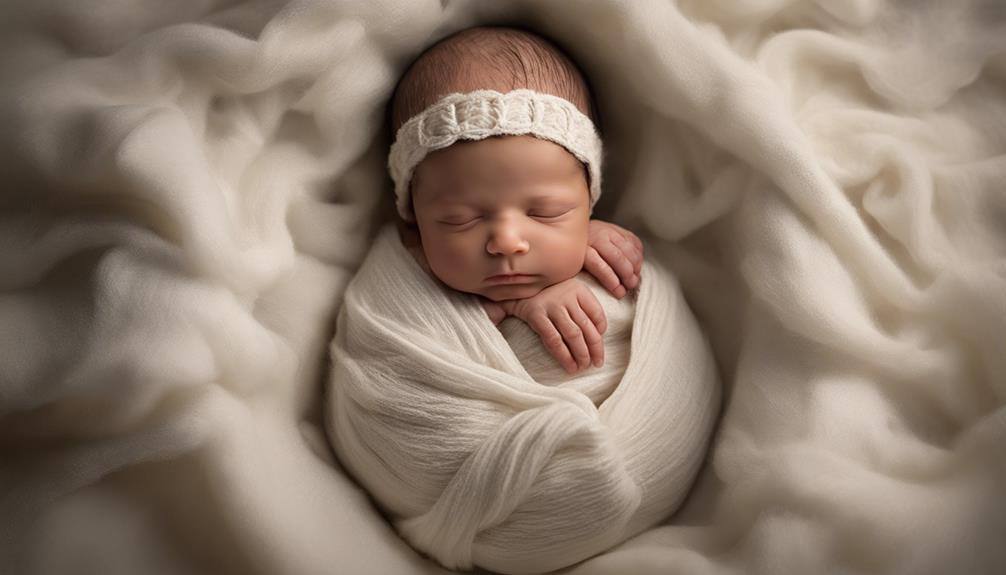
During light sleep cycles, rapid eye movement (REM) sleep in newborns typically triggers jerking movements as a result of developing brain activity and muscle coordination. This stage plays an important role in the neurological development of newborns, aiding in the refinement of motor skills and the maturation of the brain.
Here are some key points to think about:
- Newborns experience light sleep cycles characterized by REM sleep, where twitches commonly occur.
- During REM sleep, newborns may exhibit jerking movements due to brain activity and muscle coordination development.
- Light sleep stages in newborns facilitate brain maturation and motor skill refinement through twitching.
- Twitching in newborns during light sleep cycles is a normal part of their neurological development and shouldn't cause alarm.
- Understanding the correlation between light sleep cycles and newborn twitching is essential for recognizing typical motor development patterns.
These movements are a natural part of a newborn's growth and should be viewed within the context of their overall development.
Digestive Discomfort
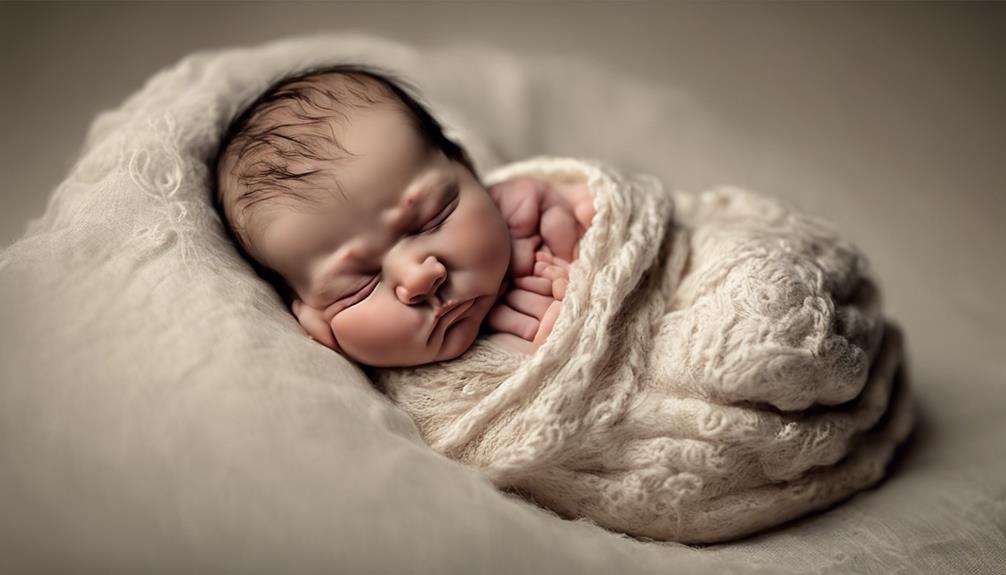
Light sleep cycles in newborns often reveal a connection between digestive discomfort and jerking movements during their sleep. Digestive issues such as gas build-up and indigestion can lead to discomfort, causing newborns to display jerky motions as they seek relief.
Factors like swallowing air during feeding or difficulties in proper digestion can contribute to this discomfort, triggering jerking episodes during sleep. It's important to pay attention to feeding techniques to minimize digestive discomfort in newborns. Ensuring that the baby is burped adequately after feeding can help prevent gas build-up and reduce the likelihood of jerking movements during sleep.
Sensory Overload
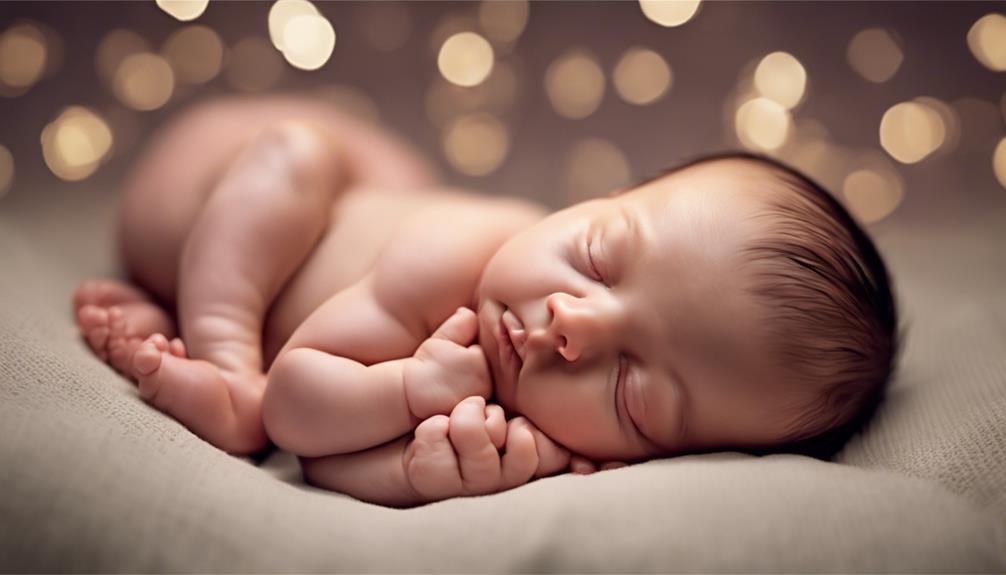
Sensory overload can induce sudden jerking movements in newborns during sleep, caused by their immature nervous systems being easily overwhelmed by external stimuli. Factors such as loud noises, bright lights, or rough handling can trigger these jerking movements, disrupting the newborn's sleep patterns and leading to frequent awakenings.
To address this issue, creating a vital and soothing sleep environment is essential in reducing sensory overload and decreasing jerking episodes in newborns.
- Newborns' immature nervous systems make them sensitive to sensory input.
- Loud noises and bright lights can startle newborns during sleep.
- Sensory overload may lead to sudden movements or jerks.
- Disrupting sleep patterns, sensory overload can cause frequent awakenings.
- Providing a calm environment can help mitigate sensory overload and promote better sleep for newborns.
Dreaming and REM Sleep
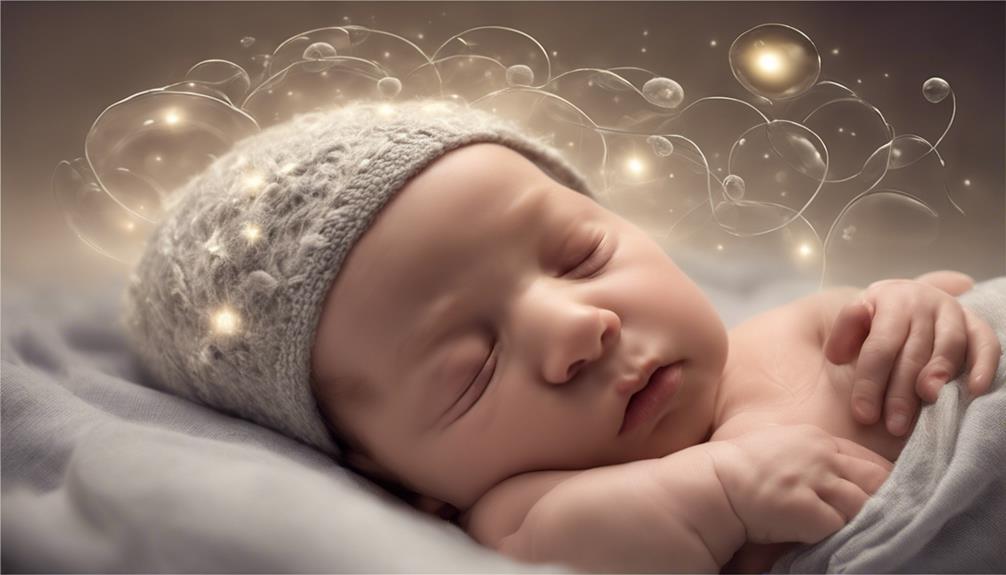
During REM sleep, newborns exhibit dream characteristics and heightened brain activity, leading to muscle twitches and jerks. This stage is vital for newborn brain development, aiding in emotional regulation and memory consolidation.
The jerking movements observed during REM sleep play a significant role in motor skill development and are linked to the maturation of the central nervous system.
Dream Characteristics
Engaging in vivid dreams characterizes rapid eye movement (REM) sleep, a stage where the brain exhibits wakefulness-like activity and muscles are temporarily paralyzed to prevent dream enactment. During this phase, several key dream characteristics are observed:
- Dreaming occurs during REM sleep, leading to vivid dreams.
- REM sleep involves brain activity similar to wakefulness.
- Muscle paralysis is induced to prevent physical reactions to dreams.
- Newborns exhibit jerking movements during REM sleep, potentially linked to dream enactment.
- The brain's activation during REM sleep contributes to the twitching or jerking movements seen in newborns.
Understanding this connection can offer insights into early brain development.
Brain Activity During
Newborns' jerking movements during sleep are closely linked to the heightened brain activity observed during REM sleep, particularly in the limbic system responsible for emotions and memory.
During REM sleep, newborns experience intense brain activity marked by vivid dreams and rapid eye movements. Neural circuits within the brain become activated, contributing immensely to cognitive development and emotional processing.
The limbic system, essential for memory consolidation and learning, plays a pivotal role during this stage. These processes are fundamental for the overall brain development and cognitive functioning of newborns.
Understanding the intricate workings of the brain during REM sleep sheds light on the importance of this phase in shaping neural connections and fostering healthy brain development in infants.
Importance of REM
REM sleep is a critical stage characterized by rapid eye movements and muscle twitches. It is essential for dreaming and plays a significant role in processing memories and emotions in the brain. During this stage, the brain is highly active, contributing to memory consolidation and cognitive function.
In infants, REM sleep is particularly important for brain development, aiding in sensorimotor development and the organization of neural pathways. This deep stage of sleep is crucial for learning and overall cognitive function, ensuring proper brain maturation.
The twitches observed in newborns during REM sleep are believed to be intricately linked to their developing sensorimotor skills and the establishment of essential neural connections.
Frequently Asked Questions
Is It Normal for Newborns to Have Jerky Movements While Sleeping?
Yes, it's normal for newborns to have jerky movements while sleeping. These movements, related to brain maturation and neural development, aid in motor coordination and pathway formation. They usually resolve independently and indicate healthy development.
Is It Normal for Babies to Jerk While Sleeping?
Yes, it's normal for babies to jerk in their sleep. This involuntary movement, like arm or leg twitches, aids in neural development. Over 70% of infants exhibit these sleep jerks, important for motor coordination.
What Causes Jerking in Newborn?
We've found that newborn jerking during sleep is commonly due to developing nervous systems and reflexes. As newborn brains rapidly mature, involuntary movements occur. It's a normal part of neurological growth and often resolves with time.
Is Jerking as a Newborn Normal?
Yes, jerking as a newborn is normal. It is a common occurrence due to the developing nervous system and brain maturation. Involuntary movements during sleep are signs of healthy sensorimotor development, aiding in motor skill progress.
Conclusion
To sum up, newborns jerking in their sleep is a natural and beneficial phenomenon. These movements are essential for their development, helping them build motor skills, learn about cause and effect, and navigate their sensory world.
Just like a caterpillar turning into a butterfly, these jerky movements signify growth and transformation in the early stages of a baby's life.
